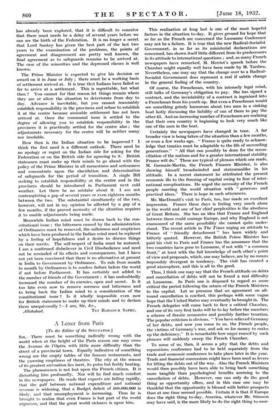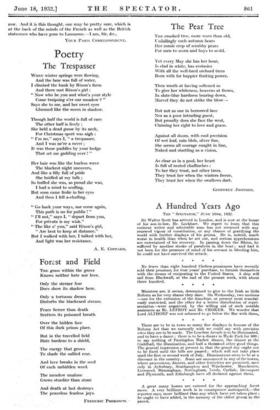A Letter from Paris
[To the Editor of the SPECTATOR.] Spa,--There must be something radically wrong with the world when at the height of the Paris season one may cross the Avenue de l'Opera with little more difficulty than the street of a provincial town. Equally indicative of something wrong are the empty tables of the famous restaurants, and the yawning emptiness of theatres. The city at the season of its greatest animation lies inert, its pulse but feebly beating. The phenomenon is not lost upon the French citizen. It is disturbing him profoundly. Nor will he find much comfort in the newspapers. He reads that exports are falling rapidly, that the gulf between national expenditure and national revenue is widening, that a Budget deficit of £60,000,000 is likely, and that unemployment is increasing. Thus he is brought to realize that even France is but part of the world organism, and that the great world sickness is upon him. This realization at long last is one of the most hopeful factors in the situation to-day. It gives ground for hope that so far as the French are concerned the Lausanne Conference may not be a failure. It is true that the new Radical-Socialist Government, in so far as its ministerial declarations are concerned, has shown itself little different from its predecessors in its attitude to international questions ; and, as many French newspapers have remarked, M. Herriot's speech before the Chamber might equally well have been made by M. Tardieu. Nevertheless, one may say that the change over to a Radical- Socialist Government does represent a real if subtle change in the general feeling of the country.
Of course, the Frenchman, with his intensely legal mind, .
still talks of Germany's obligation to pay. She has signed a contract, and the inviolability of a contract is ingrained into a Frenchman from his youth up. But even a Frenchman would see something grimly humorous about two men in a sinking boat hotly discussing the liability of one of them to pay the other £5. And an increasing number of Frenchmen are realizing that their own country is beginning to look very much like one of the men in the boat.
Certainly the newspapers have changed in tone. A far broader view is being taken of the situation than a few months, or even a few weeks ago. " France is quite ready to acknow- ledge that treaties must be adaptable to the life of succeeding generations." " All that can possibly be done for the recon- ciliation of the nations and for a greater international stability France will do." These are typical of phrases which one reads. M. Germain-Martin, the French Finance Minister, is also showing himself broadminded and statesmanlike in his attitude. In a recent statement he attributed the present economic ills to the freezing of capital owing to fear of inter- national complications. He urged the necessity of the French people meeting the world situation with " generous and practical ideas." There is hope in such utterances.
Mr. MacDonald's visit to Paris, too, has made an excellent impression. France these days is feeling very, much alone
in the world and one of her chief perplexities is the aloofness of Great Britain. She has an idea that France and England between them could manage Europe, and why England is not enamoured of the same possibility she cannot quite under- stand. The recent article in The Times urging an attitude to France of friendly detachment " has been widely and bitterly quoted. However, the British Prime Minister has paid his visit to Paris and France has the assurance that the two countries have gone to Lausanne, if not with a common front," at least with the full knowledge of each other's point of view and proposals, which, one may believe, are by no means impossibly divergent in tendency. The visit has created a good atmosphere, and this is all to the good.
Thus, I think one may say that the French attitude on debts and cancellation of debts will not be found a real difficulty at Lausanne. In Paris one is disposed to regard as more critical the period following the return of the French Ministers to the capital. Let us presume that an agreement on all- round cancellation is reached, this perhaps with some vague hope that the United States may eventually be brought in. The French delegates will come back to face a critical Chamber, and one of its very first tasks will be to lay before the members a scheme of drastic economics and possibly further taxation. The popular criticism is obvious. " You have relieved Germany of her debts, and now you come to us, the French people, the victims of Germany's war, and ask us for money to make up the deficiency." It is remarkable how anger roused by such phrases will suddenly sweep the French Chamber.
To some of us, then, it seems a pity that the debts and reparations conference had to be held separately from the trade and economic conference to take place later in the year.
Trade and financial concessions might have been used as levers for lifting the debts out of the way. Also the French Ministers would then possibly have been able to bring back something more tangible than psychological benefits accruing to the cancellation of debts. However, one can only do the good thing as opportunity offers, and in this case one may be thankful that the opportunity is blessed with better prospects than at one time seemed possible. Certain it is that if Europe does the right thing to-day, America, whatever Mr. Stinison may have said, is the more likely to do the right thing to-mor- row. And it is this thought, one may be pretty sure, which is at the back of the minds of the French as well as the British statesmen who have gone to Lausanne.—I am, Sir, &c., YOUR PARIS CORRESPONDENT.









































 Previous page
Previous page